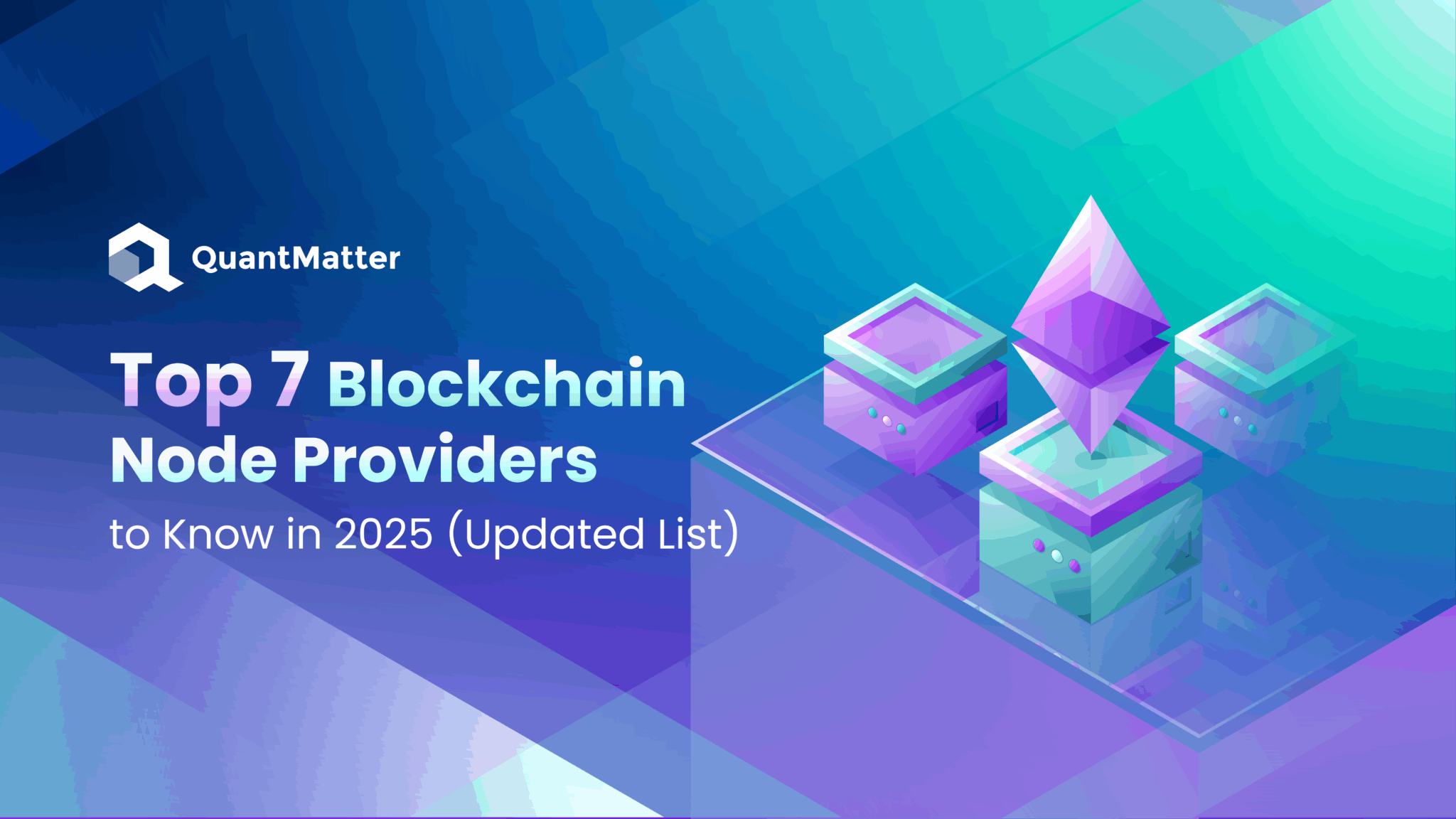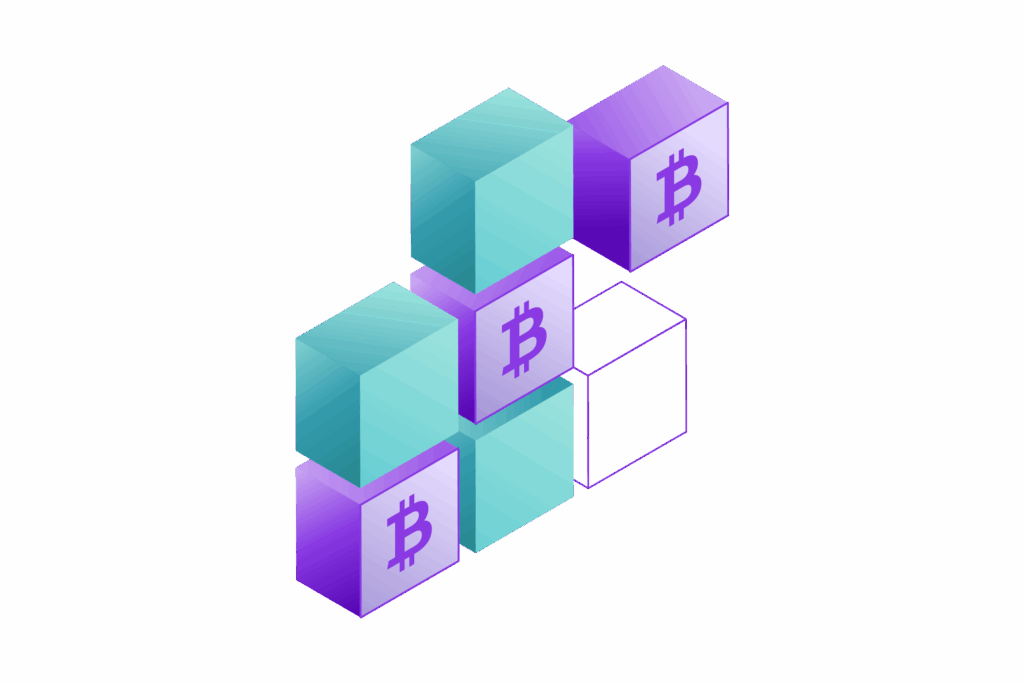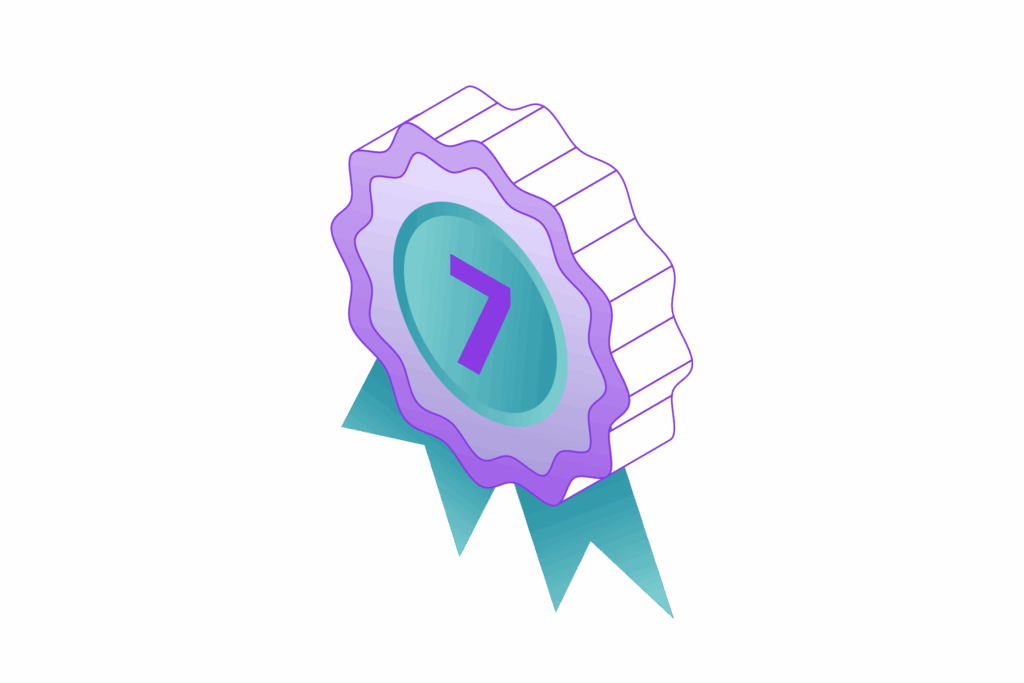
Running your own blockchain node can be a heavy lift. It takes time, money, and ongoing maintenance. That’s why many developers and businesses turn to node providers. These services take care of the heavy lifting—letting teams build apps, run transactions, and verify data without managing the back end.
In 2025, as the blockchain industry keeps growing, reliable node providers are more important than ever. Whether you’re building on Ethereum, Solana, or a new Layer 1, fast and consistent node access is a must. And with more competition in the market, knowing the top options is key.
This article lists the top 7 blockchain node providers to know in 2025. We also cover what makes a good node provider, key trends in the space, and how to choose the right one for your project.
What Is a Blockchain Node Provider?

A blockchain node provider offers access to blockchain networks through ready-to-use nodes. Instead of setting up your own full or archive node, you can connect to a provider’s infrastructure. This lets you interact with blockchains—reading data, submitting transactions, or building dApps—without managing the backend.
Node providers can offer public or private access. They may also provide APIs, analytics tools, and uptime guarantees. Some focus on speed, others on decentralization or cost. Picking the right one depends on your needs—whether you’re launching a high-volume app or just testing on testnets.
These providers are a key layer in the Web3 stack. They help developers move faster and lower the barrier to entry for blockchain development.
Also Read: What Are Algorithmic Strategies? Learn to Solve Problems Effectively
Key Features to Look for in a Node Provider

Choosing the right blockchain node provider can make or break your project. It’s not just about getting access to a blockchain network—it’s about getting reliable, secure, and scalable infrastructure that supports your development goals without surprises. With so many providers out there in 2025, it’s important to know what features really matter before committing to one.
Here are the key things to look for when evaluating a node provider:
- Multi-chain support: If you’re working on projects that involve multiple blockchains or plan to expand beyond one chain in the future, choose a provider that supports a wide range of networks. Some providers specialize in one or two chains, while others offer RPC access to 20 or more. Going multi-chain helps you stay flexible as your app or business grows.
- Speed and latency: The speed of your node connection affects everything from transaction confirmation times to user experience. A low-latency infrastructure means your app can send and receive blockchain data quickly. Look for providers that have nodes distributed across global regions to reduce response times.
- Reliability: Downtime can cause missed transactions, broken features, and lost trust from users. Choose providers that offer 99.9% uptime or better. Some also offer service-level agreements (SLAs) that guarantee performance and provide compensation if things go wrong. Uptime is especially important for apps with real-time features like trading or gaming.
- Data availability: Different apps require different types of data. Some just need current state data; others need access to the full transaction history. Archive nodes let you query historical data going back to the genesis block. Make sure your provider offers the type of node—full, archive, or light—you need for your use case.
- Security: A good node provider will have strong protections against common threats like DDoS attacks, data leaks, or unauthorized access. Look for providers that offer secure endpoints, encrypted data transfers, and rate limiting to block bad actors. Enterprise-grade providers may also comply with industry security standards and certifications.
- Pricing: Every project has a budget. Some node providers charge by usage (per call or per GB), while others offer monthly subscriptions with usage caps. Make sure the pricing model fits your expected traffic. It’s also helpful if they offer a free tier for testing and transparent documentation about overage charges or throttling.
- Developer support and tools: While not always top of mind, documentation, SDKs, and developer tools can make a big difference in how quickly you can build. Some providers also offer dashboards, logs, and monitoring tools to help you track usage and diagnose issues.
In the end, the best node provider is the one that fits your specific needs. There’s no one-size-fits-all solution. Whether you care more about multi-chain access, rock-solid uptime, or low-cost scaling, taking the time to evaluate these features will help you avoid headaches down the road. Think of it as a foundational decision—because everything you build will depend on it.
Top 7 Blockchain Node Providers to Know in 2025

Here are some of the leading platforms making waves in blockchain infrastructure for 2025:
- HeLa Guardian Node – Best for modular security and on-chain governance
- Alchemy – Developer-friendly tools and enterprise-grade APIs
- QuickNode – Fastest global RPC access with multi-chain support
- Infura – Seamless Ethereum and IPFS integration
- Chainstack – Scalable, team-based RPC solutions
- Blockdaemon – Enterprise-grade infrastructure and staking
- Ankr – Decentralized Web3 development and staking suite
Looking to power your dApp, DeFi protocol, or blockchain analytics platform in 2025? Here’s a detailed look at the Top 7 Blockchain Node Providers reshaping the infrastructure layer of Web3. Whether you’re building for speed, decentralization, or enterprise scalability, these platforms offer the tooling, uptime, and network reach you need to build with confidence.
1. HeLa Guardian Node
The HeLa Guardian Node stands out as the foundation of HeLa’s modular blockchain architecture. As part of the network’s unique layered approach, Guardian Nodes play a critical role in monitoring, validating, and safeguarding the chain’s core processes. These nodes proactively detect and mitigate misinformation, latency issues, and malicious behaviors, helping maintain security and performance integrity across the entire network. Their vigilance ensures decentralized apps (dApps) built on HeLa perform without disruption. Additionally, Guardian Nodes are integral to ecosystem governance, aligning with HeLa’s mission to build a user-centric, scalable Web3 infrastructure.
| Pros | Cons |
| Modular security and governance layer | Currently specific to the HeLa ecosystem |
| Real-time performance monitoring | Still in early adoption phase |
| Enables secure DeFi and dApp deployment | Limited external benchmarking |
| Built for scalability and low-latency finality | Requires staking commitment |
| Strong documentation and active community | Not a general-purpose node provider |
2. Alchemy
Alchemy remains a favorite among developers thanks to its robust Web3 developer platform and exceptional uptime. It supports major chains like Ethereum, Arbitrum, Solana, and Optimism, enabling seamless multi-chain dApp development. Its suite of tools—Alchemy Monitor, Notify, and Build—greatly simplify debugging, analytics, and real-time monitoring. Known for powering some of the largest DeFi and NFT projects, Alchemy is ideal for developers who want deep insights into how their apps interact with the blockchain. Its enterprise-grade reliability and wide-ranging API support make it a foundational choice for scalable blockchain development.
| Pros | Cons |
| Developer-first platform with excellent APIs | Can be costly for smaller projects |
| Supports major blockchains and L2s | Limited decentralization of backend |
| Trusted by OpenSea, Meta, Adobe, etc. | May not suit projects needing full node access |
| Real-time notifications and analytics | Requires developer expertise to fully utilize |
| Outstanding uptime and network reliability |
3. QuickNode
QuickNode is engineered for speed and global reach, making it ideal for real-time applications and latency-sensitive platforms. It offers globally distributed RPC endpoints and supports dozens of networks including Ethereum, BNB Chain, Polygon, and more. Developers benefit from a powerful dashboard, advanced analytics, and the ability to scale dApps rapidly without infrastructure bottlenecks. It also includes WebHooks and WebSockets, helping developers handle live event streams with ease. With its strong focus on performance, QuickNode is best suited for teams looking to deliver high-throughput applications.
| Pros | Cons |
| Ultra-fast global RPC access | Less feature-rich than some competitors |
| Wide blockchain coverage | Enterprise pricing tiers can be steep |
| Built-in analytics and monitoring | Limited free tier options |
| Excellent documentation | No built-in staking or validator services |
| Strong support for event-driven apps |
4. Infura
Infura, a product by ConsenSys, is a trusted name in Ethereum infrastructure. It provides scalable, reliable access to Ethereum and IPFS, removing the need for developers to manage their own nodes. With high availability and seamless integrations with Metamask and Truffle, it’s a staple in many Ethereum-based projects. Infura has been the backbone of Ethereum dApps since the early days, and continues to evolve with EVM-compatible networks. However, it operates as a centralized service, which has sparked decentralization concerns in certain circles.
| Pros | Cons |
| Plug-and-play access to Ethereum & IPFS | Centralized infrastructure |
| Long-standing reputation and stability | Doesn’t support as many chains as competitors |
| Deep integration with Ethereum developer tools | Limited control over node configuration |
| Excellent for quick dApp deployment | Lacks full transparency for some metrics |
| Scalable solution for developers of all levels |
5. Chainstack
Chainstack offers a scalable, subscription-based RPC service with powerful team management features. Supporting over 25 blockchain networks, it’s ideal for startups and enterprises looking for predictable costs and simple node deployment. The platform offers robust debugging tools, SLA-backed uptime, and multi-tier access control. It stands out for its ability to spin up dedicated nodes in just minutes, and its documentation is suitable even for non-developers. While it lacks features like MEV protection or staking, Chainstack remains a solid option for teams focused on ease-of-use and operational reliability.
| Pros | Cons |
| Supports over 25 networks | No MEV protection included |
| Affordable pricing for startups | Limited native staking integration |
| Easy team access and debugging tools | Doesn’t offer validator services |
| SLA-backed service with predictable performance | Lower configurability compared to bare-metal nodes |
| Great onboarding experience |
6. Blockdaemon
Blockdaemon is one of the most trusted node infrastructure providers for institutions and enterprises. It supports a wide range of protocols including Ethereum, Solana, Bitcoin, and Polkadot, among others. Its focus is on security, compliance, and scalability, offering everything from validator nodes to staking services and multi-cloud support. Organizations value Blockdaemon for its managed infrastructure and hands-on support, especially in regulated environments. However, its services are tailored more toward enterprises than indie developers.
| Pros | Cons |
| Institutional-grade node infrastructure | Not ideal for individual developers |
| Extensive protocol and staking support | Premium pricing |
| Highly secure and compliant | Complexity may overwhelm smaller teams |
| Offers validator and archive node services | Less community-focused |
| Trusted by major financial institutions |
7. Ankr
Ankr is a Web3 development hub offering decentralized node hosting, multi-chain access, and staking solutions. It positions itself as a bridge between Web2 and Web3, providing services like liquid staking and decentralized infrastructure in one platform. Its decentralized RPC services give developers the option to avoid centralized dependencies, which is increasingly important in 2025. Ankr also powers services behind projects like Binance and Microsoft’s Web3 initiatives. With its focus on accessibility and decentralization, Ankr is a go-to for teams seeking scalable and censorship-resistant solutions.
| Pros | Cons |
| Fully decentralized infrastructure option | UI/UX could be improved in some tools |
| Offers staking, liquid staking, and API services | Limited documentation in some advanced areas |
| Multi-chain support (ETH, BNB, Avalanche, etc.) | Some advanced features require ANKR tokens |
| Used by major platforms like Binance | Less customizable analytics tools |
| Cost-effective and beginner-friendly |
The blockchain space continues to mature in 2025, and choosing the right node provider is more critical than ever. Whether you’re an indie developer building your first dApp or an enterprise scaling global applications, the options above offer the performance, tools, and reliability needed to succeed.
From the secure modularity of HeLa Guardian Nodes to the developer-centric tools of Alchemy, and the enterprise backbone of Blockdaemon, each provider brings a unique strength to the table. Evaluate based on your project’s goals—speed, decentralization, cost, or compliance—and you’ll find the ideal partner among these top 7 blockchain node providers.
Also Read: 7 Best AI Crypto Coins to Consider in 2025
Choosing the Right Node Provider for Your Project
Picking a node provider isn’t just about who offers the most features—it’s about who offers the right features for your needs. Different use cases require different types of performance, reliability, and tooling. Whether you’re building a DeFi protocol, a mobile wallet, or a blockchain-based game, the right infrastructure partner can save you time, money, and headaches down the line.
Here are the key steps to help you make an informed choice:
- Start with your chain: Not all node providers support every blockchain. Some focus on Ethereum and major Layer 2s, while others support newer or niche chains. Begin by filtering out providers that don’t support your primary development network. If you plan to expand into multi-chain later, keep that in mind too.
- Estimate your traffic: Think about how much traffic your app will generate. Are you running a lightweight test app, or something with thousands of daily users? High-volume apps may need dedicated infrastructure, higher rate limits, or guaranteed uptime through an SLA.
- Check pricing: Pricing structures vary widely. Some providers charge based on requests, others by bandwidth or subscription. Look for transparent and scalable pricing that fits your current budget and won’t bottleneck you as you grow. Also, double-check for any hidden fees or throttling on free plans.
- Evaluate their APIs: Good APIs and developer tools are essential for building efficiently. Check whether the provider offers solid documentation, SDKs in your preferred language, and support for common Web3 development workflows. The easier it is to integrate, the faster you’ll ship.
- Test their speed: Speed matters—especially for real-time apps like trading platforms or on-chain games. Most providers offer a free tier or trial access, so take advantage of that. Benchmark latency and reliability under realistic usage to see if they meet your needs.
Take your time comparing different providers. Read reviews, run performance tests, and talk to support teams. A good provider should offer trial access, answer technical questions clearly, and have a track record of reliability. Don’t rush the decision—your project’s stability may depend on it.
Choosing the right node provider is more than a technical choice. It’s a partnership. The right one will not only give you access to the blockchain but also help you grow and scale with confidence.
Conclusion
Blockchain apps rely on solid infrastructure. Without fast and reliable node access, even the best dApps can falter. That’s why choosing the right node provider is so important.
In 2025, the market offers more options than ever. Whether you want maximum decentralization, low cost, or enterprise-grade performance, there’s a provider that fits. The seven listed here are some of the best, trusted by developers across Web3.
As you scale your project, revisit your infrastructure choices. The right node provider today might not be the right one tomorrow. Keep an eye on performance, cost, and new features—and stay ready to adapt.
Disclaimer: The information provided by Quant Matter in this article is intended for general informational purposes and does not reflect the company’s opinion. It is not intended as investment advice or a recommendation. Readers are strongly advised to conduct their own thorough research and consult with a qualified financial advisor before making any financial decisions.

I'm Carina, a passionate crypto trader, analyst, and enthusiast. With years of experience in the thrilling world of cryptocurrency, I have dedicated my time to understanding the complexities and trends of this ever-evolving industry.
Through my expertise, I strive to empower individuals with the knowledge and tools they need to navigate the exciting realm of digital assets. Whether you're a seasoned investor or a curious beginner, I'm here to share valuable insights, practical tips, and comprehensive analyses to help you make informed decisions in the crypto space.
- Carinahttps://quantmatter.com/author/carina/
- Carinahttps://quantmatter.com/author/carina/
- Carinahttps://quantmatter.com/author/carina/
- Carinahttps://quantmatter.com/author/carina/
